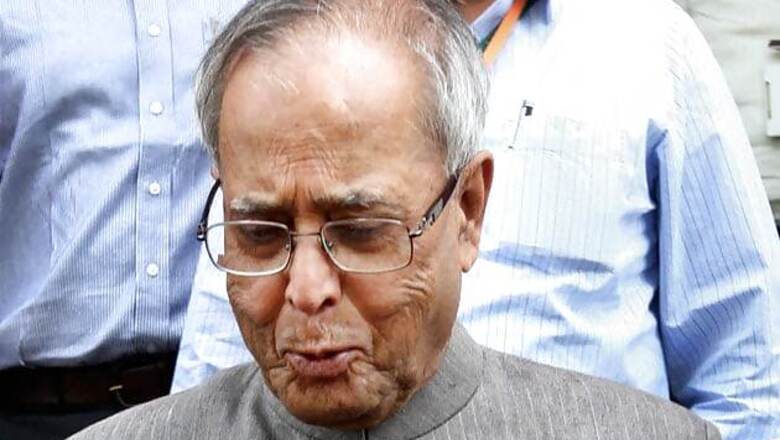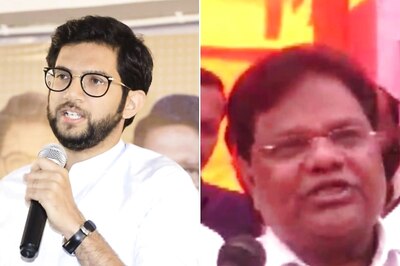
views
New Delhi: Finance minister Pranab Mukherjee on Monday deferred the implementation of GAAR (General Anti-Avoidance Rules) to 2013-14. Speaking on amendments in the Finance Bill in parliament, Pranab also said the onus of proof will lie with the tax authorities and that the proposed retrospective amendment of income tax laws will not override DTAAs with 82 countries.
Dinesh Kanabar, Deputy CEO & Chairman, Tax at KPMG and Ketan Dalal, Joint Tax Leader at PwC talk about what the finance minister had to say on Monday in Parliament.
According to Kanabar, there have been a couple of welcome changes from a law perspective. Apart from the fact that GAAR will be implemented in the next fiscal, the burden of proof is now on the revenue. Secondly, one can now approach the authority for advance ruling and seek a clarification on any transaction covered by GAAR.
While this is a short-term relief, Dalal feels it needs a much longer term kind of framework to give certainty and comfort to the investors. Echoing Kanabar's view, Dalal added that the the onus of proof being shifted to the tax authorities is a welcome move.
Below is the edited transcript of the interview. Also watch the accompanying videos.
Q: Do you think the GAAR comes with any riders which you are uncomfortable with?
Kanabar: I don't think it's a question of riders. The government has done is two things - first, it has constituted a committee, which was set up quite some time ago. It has now nominated individuals from the Ministry of Law to be on that committee, which will look at various aspects of General Anti Avoidance Rules (GAAR).
The finance minister had made a statement on the floor of the parliament to say that he would like to introduce a GAAR which is as less subjective as is humanly possible. Hopefully, the committee will come up with recommendations, which will go into the final rules etc.
From a law perspective, there have been two-three very welcome changes. Apart from the fact that everything is being pushed back by a year, there is a burden of proof now on the revenue. Secondly, you have an ability to approach the authority for advance ruling and seek a clarification as to whether a particular transaction is or is not covered by GAAR. However, there were a number of requests or suggestions, which have been given to the government; many of which have still not come through.
So for example, one very important suggestion was that the approving panel within the tax office, which will approve of any additions in an application of GAAR. One suggestion was that there should be an external industry person also on that. That hasn’t happened and number of other things. So we need to wait and see what the committee will come up with and what will get finally legislated.
Q: What would you gauge would be the immediate impact though of this delay because last we heard a lot of people had stopped issuing any fresh PE Notes. There was a fresh tax that was being slapped, withholding tax by banks. Has all of that resumed?
Dalal: As Dinesh said, this one year deferment is of course very welcome. But we are just ten months away from the next Budget. While it is a short-term relief, it needs a much longer term kind of framework to give certainty and comfort to the investors; by the very nature, it is subjective. So to answer your question, to some extent, it will give some comfort in terms of the Mauritius treaty etc unless of course the circular is withdrawn.
But it does need a much longer framework within which one can function because private equity investors who will divest in less than a year after today could still be hit by the GAAR via the Mauritius treaty. So yes, it is a short-term relief but one has to see the fine print. The fact, as Dinesh said, the onus of proof has been shifted is very welcome.
Q: Do you think the onus of proof has been an extremely important clarification or change in GAAR that may limit the scope in terms of companies or investors who get affected?
Dalal: There are two parts to that; one is yes, conceptually, legally there is no doubt in my mind that the shifting of the onus of proof from the taxpayer to the tax authority is very welcome. In a sense, it limits the application of GAAR and that is the way it should be.
However, one needs to realize the unfortunate reality that in India there is very often a significant disconnect between policy making and ground reality. So yes, while it will certainly help from a legal framework, one hopes that the rules that come out further ring fence the ability of tax authorities to use too much discretion. But conceptually, no doubt about it, it helps.
Q: Do you think the government will find it easy to implement GAAR next year because we may just amble through the next nine months and then we face with the same problem nine months from now with not too much confusion. In that case, do you think it would have bought some time but we will be faced with the same issues in three quarters?
Kanabar: There is a broader way to look at it. Firstly, the government has given a notice to people to say if you need to build in substance, if you need to reorganize, do whatever you need to do as a transition, provision before 31 March ’13. That is very important because when you are moving from one regime to another, you need to allow a period of transition. By giving this notice, the government is giving this period of transition.
Secondly, one of the important things happening as a result of GAAR is the question mark on, for example, India-Mauritius or whatever the tax treaties one is looking at or the India-Cyprus Tax treaty.
There is a possibility that during this period, two things can happen. Either the treaty can be renegotiated between India and Mauritius to bring in the same limitation of benefit, which comes under the India Singapore Treaty. This will make the treaty far more robust and obviates the need to have GAAR or as we have seen in some of our interactions with the finance ministry officials, probably within the GAAR rules itself a degree of subjectivity could be removed and objectivity could be introduced. For instance, to provide that if you are spending certain money, you have certain infrastructure then tax treaty benefits will not be denied.
A lot will depend on what happens between now and the next year. At one level, if nothing happens and we continue on the status quo, exactly as you mentioned, we will have the same chaos a year from now instead of today. Otherwise, if we work towards it, probably a lot of relief could come by.
Q: Is it conceivable that despite saying that the GAAR comes into play from April 1 next year, we may have a situation with the government reopens the Double Taxation Avoidance Agreements (DTAA) between India and Mauritius. That may have repercussions, which are quite damaging for a large number of participants in the Indian financial markets?
Dalal: I think there are two parts to this. The circular states that the tax residency certificate will be considered as adequate proof of residence. The applicability of the India-Mauritius treaty is something which conceivably the government could withdraw. In fact, there were rumours that it could be withdrawn at any point of time. It hasn’t happened probably because the government fears that it will have a very adverse impact on the stock market.
But could it happen? It could. Will it happen? That is anybody’s guess. Given the state of the capital market today, it is unlikely. But as and when GAAR comes in, and as Mr Kanabar pointed out, there is a possibility of people building actual substance.
But qua Mauritius, the building of that actual substance can become a real challenge as opposed to Singapore where people are willing to move in. Therefore, the ability to manifest an actual office there, actual decision making is far higher. But yes, to answer your specific question, it could happen. But to my mind, it is unlikely especially given the reaction of foreign investors.
Q: The subtext also seems to be from yesterday that while GAAR has got postponed to next year, the Finance Ministry is still quite keen on going ahead with their stance on issue such as Vodafone; that is any such large lucrative cross border deals and the impact that they have in terms of taxes they can raise, do you think that defining line will still remain?
Dalal: Yes, I think as you rightly pointed out, they are keen on Vodafone. In a sense, Vodafone is a judicial application of GAAR. There was no GAAR at the point of time in 2007 when the Vodafone transaction culminated but it is an application. So to that extent, they are keen to trigger a tax on indirect transfers. Of course, it is anybody’s guess as to what will happen both in terms of a potentially negotiated settlement or in terms of a potential court ruling on the retrospectivity challenge itself.
Q: A last word from you because that seems to be a niggling concern for a large number of investors who are coming through the Mauritius route who are happy with the fact that GAAR has been deferred by one year but are still unclear about the fact on whether the double taxation treaty with Mauritius might be reopened and renegotiated sometime between now and next April in which case they will be equally badly off?
Kanabar: I am not too sure whether people will be equally worse off if the treaty was renegotiated. In fact, things have moved on. As I see from the ring side as to what is happening, Mauritius would today welcome a limited renegotiation of the treaty where capital gains benefits are not denied.
However, a limitation of benefit clause is introduced on the same lines as you have on India-Singapore treaty. So it depends on what is renegotiated. If the benefits are taken away, obviously the treaty loses its relevance, which I don’t think is what both sides want at this point of time.
But a limitation of benefit would be welcome by both sides and maybe even by foreign investors because that will give them some degree of certainty and some degree of the way forward



















Comments
0 comment